|
Hi there! What's something you're really, really good at? Something you do <bing!> second nature, you don't think about it, you just do it. Something that you've probably been doing a really long time and have developed into a fine art? Know what that is for you? Wanna know what mine is? Comparing myself to other people. No joke. I'm really good at it. And it's really, REALLY bad for me. This habit of mine turns me into the WORST version of myself. It makes me angry and ungrateful and sad and jealous. Like I said, it's bad for me. And it's bad for you too. I learned a long time ago that the things I need to work on the most become my best content for teaching. This past weekend I had the chance to speak to a group of amazing women about this topic, this habit, this ability we all have to compare ourselves to others. I won't repeat the talk for you here but I will show you my notes. Read these, throw in some oversharing by Jenné about my pajama pants and my unshaved legs and basically you were there. If I had to boil down all the learning I've had through the years on this topic, I think the number one key to fixing this in your life is knowing and living your true purpose.
(oh, just that?) Bottom line: if you are going to stop engaging in unhealthy habits like comparing yourself to everyone else, you're going to have to move closer to the best version of you. At some point, you're going to have to discover why you are here. What's your purpose? It does you no good to shy away from the question. Ask it. Ask yourself. Be brave enough to ask yourself why you are here and answer this question: When you are at your best, what do you do, for whom, and why? It's that simple and it's that complicated. And the answer will change your life. I believe in you! Love, Jenné
0 Comments
I have a confession to make.
It's about my behavior during the Olympics. No, I didn't use PEDs or urinate on anything. And I didn't get all angry and bitter when a certain athlete didn't perform as I hoped or when I thought judging was a little too subjective. In fact, I'm a pretty great Olympic viewer. I watch a LOT of events, not just the popular ones. I root root root for the home team AND I love a good underdog story. I cry at the National Anthem - anyone's National Anthem. I cheer like a madwoman at the TV and I become an instant expert on sports I've never heard of. "Get your head down!" "PULL PULL!" "Steady this time, steady steaaaaaady... see his form? Not good. YOU'LL GET 'EM NEXT TIME, YOU!" My confession comes about one specific evening when our whole household - dogs included - were watching the qualifying heats of some track event. In every heat there would be one or two athletes who didn't come close to qualifying. At the gun, they drifted so far behind they didn't even get television coverage. Athletes who would cross the finish long after the qualifiers finished and sometimes even well after we went to commercial. Keep in mind, these were the qualifying heats. Which often lead to semi-finals, then finals. These athletes weren't even getting past the first round. They came to Brazil to not even get past the first round. So (and here's my confession) as I was watching, I called over my shoulder to Steve and I said, "Why do those people back there in the back even bother? I mean, what's the point? It's so much energy and it costs so much to travel there and be there and they don't even have a chance. They KNOW they don't have a chance. There is NO CHANCE of them even coming close to winning. Why do they show up at all?" It's like I'd lost my mind or something. When I finally looked over at Steve, he was looking at me like I was speaking Portuguese. Or maybe was I joking? Or maybe I really did lose my mind. His face was all squinted up and his mouth was open with his lip sorta half curled in a perfectly perfect non-verbal "are you really saying that?" expression. It jolted me. Me, who knows better. Me, who is the QUEEN of the back of the pack. Me, who JUST WROTE an email about choosing hard things. Me. I said that. As if there is no glory in getting there. Forget the fact that any one of those bozos could run circles around me - literally. Forget the fact they really are the best in the world. Forget that IT'S THE OLYMPICS and they EARNED their right to be there. Why the heck wouldn't they go? I know better. I really do. I started running when I turned 40 and I was immediately bad at it. Like, right away. And I've maintained my success at being bad at it. I've been running now for 7 years. I still suck eggs. But I keep doing it. Not because I'm good at it and not because I'm getting better but because what would it say about me if I didn't? It's good to be bad at something. It's good to embrace the "so what?" every now and then. It's good to come in last. Don't let the world out there fool you. Don't let your family history or your internal dialogue or twisted interpretation of what you think you are supposed to be trick you into caring too much about how you perform. Gold, silver, bronze, participation ribbon, or nothing at all, you are still you. And you're pretty awesome. Love, Jenne Hi! I've got something on my mind.
It's pretty straight forward and pretty un-exciting. But it's truth. And, if you are like me, you need a little truth on this Tuesday. Here it is: Getting better is hard work. That's it. That's your truth of the day. Having conversations you don't want to have = hard. Physically changing your body so that it is healthier and stronger and more of what you want it to be = hard. Finally sitting down and doing a budget = hard. Sticking to that budget = HARD! Facing the fact that you get defensive too often and for too many things = hard. Realizing you've been playing the victim card and you need to stop that nonsense right now = hard. Quitting a job (or a relationship or a habit) that's not right for you without any other reason than "it's not good for me" = hard. Hard. Hard. Hard. But! Here's another equally important truth. Hard things are not impossible things! Hard things are just that - hard. And they don't stay hard, not always. Sometimes hard things get easier. Sometimes they don't. But that doesn't mean you aren't supposed to do them. Since when do you judge what you are supposed to do on how easy it is? Never is the answer. I truly believe we are at our best when we are doing hard things. I believe we are the closest to our best self when we are pushing and working and reaching. Not when we are stagnant and lazy and complacent. YUCK! I can't stand that person! And yet, most of us wait around and let hard things find us. We don't do hard things unless we are FORCED to do hard things. And some of us have had to do some really, really hard things: Face down a terminal disease Rebound after a long and difficult illness Try (and try and try) to recover and rebuild after a devastating loss <insert your really hard thing here> Those things were harder than we ever imagined. But we did it. Somehow we pushed and struggled and called on outside help and somehow, someway we did it. And, at least in my case, I know we were better for it. So, how about this time instead of waiting around for the hard to choose you, how about you choose the hard? How about you go ahead and do that hard thing you've been avoiding. Make the call. Swallow your pride. Put down the doughnut. Sign the papers. Get on the treadmill. Get over yourself. Say you're sorry. Embrace the change. Not because life is forcing you, but because the better version of you is waiting on the other side. Choose the hard. I believe in you. Love, Jenné I got defensive today. Someone said something and I read into it and I took it to an extreme and I got defensive. I knew I was getting defensive because I could feel it. I could quite literally feel the change in my muscles. I felt my neck start to stretch out and my chin rise - like it was trying to distance itself from the rest of me. I felt my head tilt and my eyes squint. I felt my lips purse - not pucker, in a cute little kissy kissy move - but purse in a "ooooooh reaaaaaally?" sort of move. I felt it in my chest - it got tighter, and in my heart - it got faster, and in my stomach - it got hollow. I got defensive. I sure shootin' did.
I know better. Heck, I TEACH better. I've spent hundreds of hours researching and teaching about defensiveness. I know chemically what's happening. I know it's a misfire, a misunderstanding, a misinterpretation in my brain. I know my brain is trying to protect me. I know it thinks I'm in danger and so it's reacting to a perceived threat. I know that getting defensive will only lead me where I most don't want to go. I know defensiveness ruins relationships. I know not one person in the history of forever has ever gotten defensive, reacted, dealt with the fall out and then said "Well, that went really well! Good decision!" I know all of this and still, I got defensive. Even worse, it happened today, on Positive Tuesday. C'mon me, you know better. The good news? I didn't REACT defensively. I employed a few techniques I've learned. I asked follow up questions. I listened. I found something, anything, to agree with. I told my brain "open up, open up, open up" and I got out of the conversation as soon as I could. I was safe. I didn't make it worse. Whew. Close one. But now what? What do I do with all the lingering yuck? Because even though I didn't REACT defensively, I still FELT defensive. And this is the real trick. Not just learning how not to react but learning how to retrain your brain so that a "moment in time" doesn't become "every moment, every time." So. Now for the application. Once the smoke has cleared on the moment of defensiveness, and you can think a bit more clearly, here are a few things that will keep you and me from cycling back through it all over again:
Gotta scoot. I've got some redoing to do! (and I'm gonna watch that seal again) Remember, you are awesome! I just finished watching Breaking Bad. I know, I am a bit behind the curve here but I prefer to binge watch those types of shows and that's what I did. I watched and watched and watched and eventually got to the finale. The good news - I could totally join the DEA with all the knowledge I've gained Googling themes in the show. The bad news - I'm sure I will be arrested soon because of those same searches. B
efore the men with the fancy bracelets show up, I thought I'd share a revelation I had while watching. One I can attribute directly to my Breaking Bad friends who spent a lot of time tracking each other. Here it is: If you attached a GPS unit to the bumper of my car and then later analyzed the data, it would be very boring indeed. I go the same places - all the time. I take the same route. I park as closely as I can to the same spots. I drive home the same way. The exact. Same. Way. I moved to this city 15 years ago. I can remember how hard it was to figure out where I was and where I needed to go. Many times I would have to pull over, get out of the car and look for the 1,042 foot public television antenna that was somewhat near my apartment. Only then could I reorient and head home. Eventually, I figured it out. I started to understand the loops and the roadways and what led where and to never ever get on Belinder Ave. And for a while I tooled around the city finding new things confident I could find my way back. I was no longer unsure or frustrated. I discovered malls and movie theaters. I met people at bars and coffee shops. I took random drives and meandered home. I was in a groove. And I loved it. But now, years later, I've come to a realization - I've been in this groove for a very long time. I rarely leave my groove. My groove is more than easy, it's more than comfortable, more than familiar. It's not just the routes I take around town, it's nearly everything. I run the same paths. I eat the same meals from the same restaurants. I shop at the same stores. I make my money the same way. I react the same way to frustrating people. I tell myself the same things I always have. The groove is beginning to feel different. What once was effortless and straightforward, now feels undemanding, unchallenging and simple. And, honey, I don't do simple. The painful truth: My groove has lost its groove. In fact, my groove has become a rut. And I have a burning desire to not stay here rotting in my rut. I need to change it up. Get uncomfortable. Drive a different way to a different store and park across the street. I need to challenge my thinking about familiar things. Ineed to get comfortable with being uncomfortable again. "A rut is merely a grave with both ends knocked out." - Zig Ziglar Until next time, Be awesôme. My mom has a word. At the beginning of each year, she picks a word - just one word - that will be her theme for the year.
One year, it was quiet. Another year, it was kind. (I'm still hoping for the "brownies" year.) She uses that word as a guide, a push, a motivation, a teacher. She studies the word. She looks it up and writes out the definition. She posts it various places. When she's struggling, she thinks of her word and what it has to teach her in that moment. When she's happy she finds ways to connect her word and that happiness. My mom is pretty awesome. Anyway, I think you should try that. Maybe not for a year. Maybe just for today. Or how about for the rest of this week?What word would you pick? What single word would you choose to be your theme for the rest of this week? Be careful. Once you choose your word, the universe will somehow align to help you learn the lesson that word has to teach. I can almost guarantee it. But don't be afraid of the teaching or the learning. It's what you need. My word? Calm. Why? Because things seem a little hectic right now. And I'm a bit unsettled. And I don't want to be. And I really like the word. Calm. So, Let the storm come, I'm ready for the lesson. What's your word? You know, I would ADORE it if you hit reply and told me. I'll probably even write you back. As calmly as I can. Until next time Be ____________ . Jenné 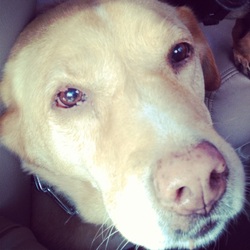 “If there are no dogs in Heaven, then when I die I want to go where they went.” - Will Rogers After 14 years, we've had to say goodbye to Pickles. It's been painfully difficult. She was the best dog ever. I know, everyone says that. And I'm sure it's true. It seems we all get the dog we most need. And we needed Pickles. There are so many memories and so many characteristics of her that we will never forget. She was empathic, funny, loving and compassionate. We've always known that about her. What we didn't realize is what a good teacher she was. As I've sat by her empty bowl and stared at the quiet backyard and draped my hand over the bed only to find empty space and not a wet, pink nose, I've begun to understand the lessons she's taught us. They are important lessons and we were clearly very slow students - it took us 14 years of her sweet companionship to learn these simple truths: 1) Always get up and greet someone when they walk into a room. Pickles never let anyone enter a room without being acknowledged - even if you only left that room 47 seconds ago. Very often, in fact, she would accompany you to the other room. She was a pink-nosed shadow to most people but always to Steve. In the past few months, Pickle's back legs haven't worked as well as they used to and sometimes Steve could quickly dart into the other room and get back before she got all the way up. "I'm coming right back, Picky!" he'd call or "Don't get up! Don't get up! Oh, Picky ... Okay." and then she'd trot behind him as he loaded his bowl into the dishwasher or moved the laundry to the basement or a hundred other little house chores. That dog has clocked more miles in this house over the years than any of us. I hate to admit this but often people enter or leave my presence with no acknowledgement at all. Not so much in my home but for sure in my day. The mailman, the guy next to me pumping gas, the homeless man on the same exact corner with the same exact sign every day. I have no qualms about scooting on by and getting on with my life. Would it be so much effort to say hello? To greet and smile? I don't have to trot behind them when they pay the bill or head off to find the gourmet cheese section but certainly I can give a little more. It costs me nothing and can mean a lot. Every living thing responds to attention. Thank you, Pickles. That's a good lesson.  2) Don't worry so much about what name people call you. "Jenne" gets pronounced many different ways: Jean, Jenny, Jeannie, Janna, etc. I spend a great deal of time and energy correcting receptionists, hostesses, clients, pizza delivery men, credit card-returning waitresses and telemarketers. "Jen-nay" I say, "It's Jen-nay, rhymes with Hooray!" or I might make it super simple "Jen-nay, like Renee but with a J". I"ll be honest, it rarely works. 14 years ago I first held my yellow puppy when she was 3 hours old. I looked down at her sleepy face and said "Hello, Pickles." The name just fit. Since that moment, however, she's been called many variations - Pickle, Pickles, PickPick, Picky, PicklePup etc. We were as guilty as everyone else. A few years ago, Steve looked at me and said, "Wait, is her real name Pickle or Pickles?" I couldn't really say. And it's never seemed to matter. Not to her anyway. I once watched her trot happily up to a neighbor who called out "Hi, Bananas!" She knew who they were talking about. What did it matter if they used her exact name? And what does it matter to me? When I correct people who deign to mispronounce my name, they always apologize. "Oh I'm sorry!" they say. And I always say "it's okay!" But if it really is okay, why do I say anything at all? Why do I correct? I know who they mean and so do they. I'm going to let that go. Thank you, Picky. 3) Being near is enough. I went running this last weekend. I saw lots and lots of doggers jogging next to their owners on the trail. Happily smiling doggy smiles they kept up and bounced their jingly collars. Those dogs must be such great company during a run. It's hard to be in a bad mood when you have Jingly Jingles running next to you. Pickles never ran with me. A couple weekends ago, I saw a man in a wheelchair who had a guide dog. I'm not sure exactly what that dog did. Perhaps that dog was able to reach things on high shelves that the man could not reach. Or maybe that man has an unseen condition the dog can sense and warn him to. Maybe the dog drives, I don't know. But I'm absolutely sure whatever that dog did, Pickles could NOT do it. Not because she wasn't smart, she was! But because Pickles loved EVERYONE. If I ever went out with Picky in public, I was soon forgotten because in Pickles mind there were "LOTS OF PEOPLES WHO WANT TO BE BONKED BY ME!" She could never be a guide dog. I'd be abandoned in a heartbeat. Pick was an OK guard dog. I guess. I mean she would bark and bark if anyone came to the door, but mostly because she was happy to see them. She sounded fierce but the second anyone came in, she'd flop and give up the belly or trot off to see if this new person wanted to know where we kept the mini-marshmallows. Bottom line, Pickle didn't have a lot of talents. Except one. She knew how to be near. She was really really good at being near. She would sit next to you and lean into you. Or she would lay her head in your lap - it's okay if you didn't want to pet her, she'd just leave her head there, just in case. Or, if tired, she might lay down, not so much next to you, but on you - on your feet. Are you in the bathroom? She'd come in. Are you in the kitchen? She'd lay behind you as you do the dishes. Working on the computer? Oops, she'd lay on and switch off the power strip. Sorry! Being near was very important to Pickle. She's not the only one. So often in life, not knowing what to say or do will keep us from saying or doing anything. Thank you, Sweet Dog, for showing me again that being near is enough. Near in presence, near in thoughts, near in love. 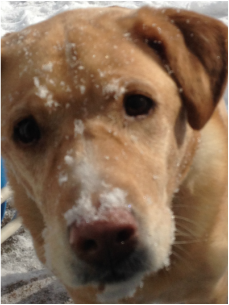 4) People first, toys second. Or third. Or not at all. 10 days ago when we had to take Pickle to the emergency vet, I knew in my heart she wouldn't be coming back home. She was 14. She'd had a great run at this life. She'd loved well and she'd been happy. We'd seen her slow down just a bit in recent months and we'd begun the discussion of "the right time." On that day, she became suddenly ill. She kept pacing from room to room looking for Nena, for me, for Steve. She was restless. Then she wasn't. I called my vet and then called the emergency vet. I told them we were coming. I could barely get the words out. I meant to say, "We're bringing our dog in. We want to see if she can be okay but if we can't fix it immediately, we are ready to make a decision." What I actually said through sobs was, "My dog ... my dog, Pickle .... it's ... she's ... I think I need to bring my dog in". They told us we could watch her or bring her in. They told us it was our choice. They said we knew her best. I laid on the rug next to her and just kept saying over and over, "Tell me what to do, Picky, please just tell me what to do." Then I looked into her eyes and knew she was telling me. Steve took her outside for a walk in the yard and then to the van. As he was lifting her in I ran back inside. I wanted to bring something, a toy, a blanket, something from home that would comfort her. Something she loved. A ball? A bone? I was frantic ... I couldn't find anything, I couldn't think of anything. I stood and spun in the living room what is it? what was her favorite thing? ... and that's when it hit me. It was us. We were her favorite things. We were her very favorite things. She didn't chase balls or sleep with a stuffed snake or carry a blanket around, she never possessed anything. Happily, over the years, she let any other dog take her bed, her bowl, her space. She shared. She adjusted. But she always claimed us. It's so obvious to us now in the pictures we flip through, in the short video clips she's wandering in and out of, in the giant hole she has left. She loved us the best. And she did it so well. In the end, we were with her. We fulfilled our role as her favorite things. We laid next to her. We patted and stroked her back. We kissed that wonderful pink nose. We reminded her we loved her. We thanked her for making us better. And then she was gone. Pickles never did much. Not really. She never entered a dog show or saved someone from drowning or ever figured out to walk by my bike without getting bike grease all over her. Pickles would drink too much water too fast and then erp it up on the carpet. She unintentionally would "table top" people by standing directly behind them. She barked like a maniac if you left her outside longer than she wanted to be outside. She never really learned any tricks. She would put her cold wet nose on you first thing in the morning and often step on your feet with her big yellow paws. She was relentlessly diligent about telling you it was time to feed her - even if you'd just fed her. She got in the way. She belched. Loudly. And she shed - a lot. It's hard to imagine that all of those things somehow combined in a way to create the best dog in the world. But they did. And now, her absence is the most present thing in our home. Night night, Picky. You really were the best. We'll miss you every day. ***This post continues the series "Advice for First Time Kilimanjaro Climbers" As I reflect on my Kilimanjaro climbs, it's hard to recall the hard. When people ask me what they most need to know when thinking about tackling Africa's highest mountain I'm all like "You'll do great!" and "It's so fun!" and "Just do it! Don't over think it!" In that way, I think climbing Kili is a little like college. You rarely, if ever, hear anyone say "well, here's the really awful part of college .." or "You know, given the chance, I'd never go back to that place where I experienced freedom and found myself for the first time." Sure there are difficult things about college - all night studying, the endless labs, the relentless homework, the constant fear of letting the GPA slip, the reoccurring chin zit that you swore you weren't going to squeeze this time but ALWAYS DID RIGHT BEFORE A DATE- but the further you get from the slog/sleeplessness/acne of college the less you remember the hard parts. It's the same with Kilimanjaro. Once you've been away from the difficulty of it for, say, 6 or 7 hours, once you've had that first hot shower (which, unfortunately may take a while since Tanzania sorta randomly decides when you're going to have water) and once you've gulped down that first celebratory Kilimanjaro Beer you will have forgotten most of the really not great things about the mountain. Except for one. Lesson number two (aptly named) : The Long Drop First, watch this video. Next get on the phone immediately with your tour operator and add a private potty to your gear list. (A private potty is a chemical toilet that a porter - lovingly called "toilet boy" - will carry up the mountain so you have a place to crap. It's basically a small Igloo cooler with a lid, don't get too excited. And if you ever need solid proof that you're American, or British, or simply not a porter, then this is it - That you will pay someone to literally carry your shit up that mountain. And you will justify it by saying "it's employment!" Which it is, you're right. And if you ever EVER need a lesson in how to not be such a douche-bag at your job, then watch the toilet boy happily set up your private potty and smile and be so grateful that you've hired him. That, my friends, will humble you. I don't care what you do for a living, after watching these men deal with your crap - figuratively and literally- for seven days, you will realize you could use an attitude adjustment.) After you've arranged to have a private potty then take a deep breath and relax. But not completely, because - Guess what? You still may have to use a long drop. (Cue "dum da dum dahhh" music.) Yep. There may be times when you have no choice but go in the longdrop or go in your pants. Go ahead. Sit with that for a while... rather, squat with it. If you've only traveled in the US or Europe, you probably aren't familiar with long drop toilets. Or scurvy. I put those two things at about the same level of pleasantness. A long drop is basically an outdoor closet - with a hole in the floor and with a whole lotta poo ...both in the hole and (somewhat impressively) scattered around the hole. It's sort of like an old-timey outhouse, but with no place to sit. Which means you squat. You place one foot on each side of the poo hole and drop it like it's hot ... which, given the amount of chicken curry you ate, it just might be. Occasionally you can find a super nice long drop that has raised pieces of wood on either side of the hole to place your feet. But mostly it's just a hole. And if you have to Number Two this will be your number one job - don't fall over. That's right, it can happen. It's difficult to balance in a longdrop, and honey, if you haven't been doing squats to prepare for this trip you need to start. Now. Between trying to keep your pantcuffs from dropping into droppings and desperately bobbling around on your toes so you don't launch forward or topple backward and worrying about how stable the wood is upon which you are standing, well, you very quickly understand not just THAT a bear shits in the woods but WHY. Because it's way better than a longdrop. Them bears are smart. But don't let it scare you away from the mountain. If you don't rent the private potty (or if you do and still find yourself in the longdrop - which you might for reasons we don't need to discuss here) here are some hints. 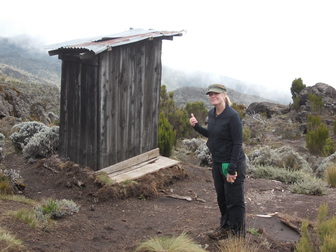 My old nemesis My old nemesis HINT 1- take your TP and some wet wipes with you. Not surprisingly, longdrops don't seem to be well stocked. And there is no cleaning schedule or way to alert the management if your longdrop has become a not-so-long drop. It's unpleasant all around. And your life will be better if you just accept it and move on. If at all possible, bring biodegradable paper and bag your wet wipe to be disposed of properly. I carried a ziplock with me that I could stuff my used wipes in - I know ... I KNOW - it's disgusting - I get it! But remember that toilet boy??? No complaining from you. HINT 2- Roll your pantcuffs up before you squat down. Most hiking pants will roll and stay rolled. This is essential. There is a scant few inches where your pants can hover safely. And when you pull your pants down make sure they are well out of the way. In fact, if you are worried at ALL about this just take your pants off. Yes. I'm serious. You can either toss them over the wall of the longdrop or wrap them around your neck. If you are going to "be there for a while" then you'll be much more comfortably knowing your potential "shit pants" (which is how you will think of them forever more should the unthinkable happen) are well out of firing range. HINT 3- The best position to use in a longdrop is fully squatted with feet flat on the floor. All the experts say this is the most comfortable and most effective method for - uh - success. If, like me, you haven't practiced this move since you were drinking from a sippy cup, you will probably find yourself doing a half-squat-elbows-on-the knees type thing. If this is your position, you need to realize your poo-hole and the longdrop poo-hole aren't going to line up. This will take some adjustment. I can't help you beyond this. In fact, I'm sorry I ever brought it up. HINT 4- Don't be confused by the sign above some longdrops declaring it a "tourist's toilet". This is only to separate those toilets from the porters toilets. It is NOT a photo op. 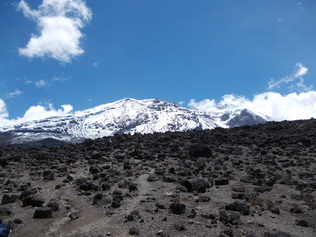 Very little coverage for when Nature calls Very little coverage for when Nature calls HINT 5- This one goes out to the ladies. You know that plastic funnel you have in the kitchen drawer? Bring it. Or something like it. In fact go ahead and throw down the dollars for a nice Freshette. You won't regret it. What is it? It's the answer to your childhood dream - it's a contraption that allows you to pee STANDING UP! and it is a MUST on Kili. The first couple of days on the mountain you will have lots of cover. And if you need to pee - which you will since you are hydrating like a champ up there - it's no issue. After day 2, however, options for cover are limited. If you are equipped with a built in funnel this won't be a problem. If you naturally have an innie and not an outie, peeing discretely will be a challenge. What to do? Well, if you've prepared properly you just grab your pink plastic wee-wee, whip that puppy out and whiz right out there in front of - well, don't actually pee in front of people. Turns out that's considered rude. But you can simply turn your back, step behind a small rock and let 'er fly. Another benefit to using a stand-up pee device - if you live with a boy, you will finally understand the dribbles. For real. From what I can tell, shaking is completely ineffective. HINT 6 - While we are on the topic of bodily functions let's just get this out of the way - You're gonna fart. A lot. It's a good thing. In fact, if you are farting well, you are faring well. That's science. And brother - chances are you will fare very well on Kilimanjaro. It's an altitude thing. So let er rip. The beautiful thing is your guides are used to it. When confronted with our gassiness, our sweet guides would say "Is okay! Is good for health!" or (my favorite) "Be free". It's good advice. Be free. No worries. Hakuna matata. Gotta honk? Simply step to the side (a courtesy to the hikers behind you) and rooty-toot-toot. Say "samahani" (excuse me) and get back in line. We're all adults here. Which, actually, will be hard to tell because it turns out farts are funny in ANY language. :giggle: Farts. :giggle: 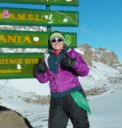 Jenne Fromm is an adventurer and a story-teller. She works with leaders to help them overcome obstacles and become the best versions of themselves. She also writes a little. You can find out more about Jenne at her website JenneFromm.com The first time I climbed Kilimanjaro I went with my sister, Carrie. Carrie is a uberplanner. And because I figured she'd have most things covered, I didn't really worry about doing much research. A few weeks before we left, I did start to watch a YouTube video about how to pack for Kilimanjaro but then I got caught up in a weird YouTube related video string and ended up watching a botfly get removed from some poor bastard who visited Bolivia. Bottom line I learned from that little internet search: Don't go to Bolivia. And - YouTube is awesome. So my learning curve was steep when I arrived on the mountain (steep - get it??? steep .. like the mountain is steep. Umkay, moving on). And I had to learn some things the old trial and error way. Which is okay and truthfully, the way I learn best. In fact, even if I'd read ahead, I'm not sure I would have listened. I'm not really known for compliance. Or even comprehension. So reading ahead may not have helped me when, say, I pee'd all over my pants on day 1. But maybe you aren't like me. Maybe you are more like my sister - who never once pee'd on herself or her pants the whole trip - and you'd like to know some hints. I'm down with that. Here's what I've got: Lesson One: Pole pole. As you climb Kilimanjaro, if you pay attention at all, you will learn a handful of Kiswahili words. One of those words is "pole pole". I know, it looks like two words. It isn't. Not really. Two "poles" - "Pole pole" means something completely different than just one "pole". Kinda like two back-to-back shots of tequila mean something totally different than one. And "pole pole" isn't pronounced like you think. It's not "pole" like a stick in the ground or the thing you use to vault. It's pronounced "poe-lay poe-lay", like you're pointing out a couple of Edgar Allen's girlfriends. "Pole pole" simply means, "slowly". If, unlike me, you've done any reading about Kilimanjaro at all, you've probably already know about going slowly. It's one of the first things people tell you. Easy does it. The slow way is the only way. The tortoise beats the hare. Blah blah blah. And I know you *think* you know what slowly means. But you don't. Not really. Slowly on the mountain is not like normal slowly. Slowly on the mountain is like the gear before you get to first gear. It's like idle, on a bike, on an incline. I'm talking SLOW. Why go slowly? Since I don't think "because I said so" will work, I will give you the actual reason. It's pretty technical. Try to keep up. Ready? Here's it is: Because if you don't, you'll crap out. (That's a climbing term you may not be familiar with. In layman's it means "get ready to pay for some hotel rooms at the base of the mountain cause you aint seein' the top. Brother.") The bottom line? Your body isn't used to altitude - and it takes time to get used to it. It needs you to go slowly so it can adjust. It can, I promise. But it takes time. Your body needs you to slow-the-jack down so it can physically adjust to the changes you're asking it to make. If you rush it, you're not going to like it. It's sort of like having sex the first time - it's not a complicated process but maybe let's not try to get it done during a commercial break of Dancing with the Stars. I just realized this analogy only works if you're female. If you'd like a more technical explanation of how your body adjusts to altitude, you can find it here. I'm assuming it is accurate. Truthfully, I didn't read the whole thing. Mostly because I scanned it and there didn't seem to be any botfly extractions anywhere on the page. For myself, I thought going slowly wouldn't be a problem. Having completed a handful of marathons and a couple of IRONMANs, I know the importance of pacing. I'm well acquainted with how important "take it easy and save it" can be. I've had to learn to dial it back and let the race come to me. Actually that's not really true. I go slowly because I really suck at running. In marathons, Ironmans, half-ironmans, olympic distance triathlons, 10Ks and 1 mile fun runs I go slowly because I don't really have a choice. That's my speed - None miles per hour. But, as it turns out, I'M SO GOOD AT WALKING! and that's what Kili is - a walk. And since I'M SO GOOD AT WALKING - I wanted to go faster ... because it was hard. Walking on Kili is hard. It's uphill (which shouldn't be a surprise to you) and it's rocky and there isn't a lot of that stuff, what's it called again? Oh yeah - air. So walking Kili is hard and when something is hard I just want to get it over with already! So maybe I pushed a little on that first day. Thankfully, I had a guide that was smart enough to recognize I was going too fast and gently reminded me of the importance of "pole pole". He gently reminded me by saying "Jenne, do not ever walk in front of me again. You stay. Here. (:::points to area behind him:::) Behind me." Got it. Direct and to the point. All clear. Roger that. So we went slowly. And we reached the top. That should be enough to convince you. If it isn't, think about this: what's the rush? Why not go slowly? Slowly is good. Slowly is great, in fact. Slowly allows for observation, reflection, enjoyment. Each day you have ONE thing to do. Just one. Get to the next camp. That's it. When you get there, your tent will be set up, your dinner will be prepared, your hot water for washing will be waiting. All you have to do is get to the camp. That's your one and only job. So chill. Downshift. The mountain isn't going anywhere. This mountain, this highest free-standing mountain in the world, has been here a long time - years, centuries, millennia - it's been keeping watch over the rainforest below, over the prowling lions and migrating wildebeests, over the nomadic Masaai and the banana-farming Chagga. It's grown trees so massive they rival buildings in any American city. It's crashed and tossed boulders the size of minivans half-way down it's slopes. It's seen the dawn of centuries, the dawn of progress, and the dawn of man. It's been there a very long time. But you won't be. You will be on Kili basking in her hospitality and wonders for a very short time. She will amaze you with her beauty and terrify you with her harshness. She will rock you to sleep under an ocean of stars. Like a Geisha, she will peek out at you from behind a thick wrap of clouds only occasionally to show you her beauty and then quickly hide behind that curtain again - closing a cloudy kimono. She will reset your previous beliefs about what's possible and what's comfortable and your very western view of showers and the need for flossing. She will make you cry, she will make you laugh, she will silence your voice while your heart babbles on and on in an ancient language translated through gasps and exhales. She will thrill you. She will seduce you. She will enrapture you. And then you will be gone. You will swear you will remember her lessons. You will close your fist around the memories and pledge to never let them go. You will say, "I will remember" and "I won't forget". And you will mean it. But. You will forget. You won't remember. Your life will crash in around you. Your flight will get canceled. Your kid will spill milk on the car rug and not tell you. Your dentist will call to schedule your cleaning. Your house gutter will fall off in a storm and need fixing. Your check engine light will spotlight out on your dashboard when YOU JUST HAD THAT FIXED LAST WEEK! and you will forget. Because that's life. But Kili is living. So go slowly. Don't rush. Breathe in. Breathe out. And climb. Pole pole. 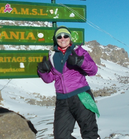 Jenne Fromm is an adventurer and a story-teller. She works with leaders to help them overcome obstacles and become the best versions of themselves. She also writes a little. You can find out more about Jenne at her website JenneFromm.com I should be in bed. I should be sleeping. I should be drifting on dreams of mountain tops and white sands and 26.2 miles of dirt ribbon. My bags are full. Zippered. Boarding passes printed. It's go time. And I am peacefully overwhelmed. It's so much - the bags, the plans, the excitement, the connections, the details, the moments of anxiety, the hours of longing, the pressure to top out, the hope, the bulge around my hips created by my buckled pack, the sheer weight of the packed clif bars and pre-packaged applesauce. It's a lot. It is very, very much. But if you would put it all on a scale, pile it all up, stack it carefully - position and reposition it so it stays - and then add more. Throw in the days and weeks leading up, and the volume of emails to get details clarified again, again? oops can you help me again? Toss on top the number of trips to various stores to accumulate various very importing things I'm hoping we will never need - Imodium, blister packs, knee braces, a freshette (look it up). And on top of that pile the paperwork and the corrected paperwork. Pile it all on. Pile it high. Add every friend that's encouraged or laughed. Add family who cheers from stateside. Add all of the airport employees and the pilots and, why not!, add the planes themselves to this stack. When we arrive in Tanzania make sure you add hippos and giraffes, wildebeast and tree-climbing lions. The hyenas don't get along with much of anyone so place them carefully but include flamingos and Range Rovers and Maasai warriors as they're jumping and dancing while their women collect water. Line up dozens of porters ready to climb the mountain again and again - add them to the scale, each weighed down with luggage and gear and food balanced on their shiny heads. Put Kili herself on there - all 5 of her climates including the rainforest she beckons you in with, and the moorland she intoxicates you with, and the peak she lures you to. Include it all. Every morsel. Every drop. Pile it high. On that side of the scale.
And then, on this side of the scale place my gratitude. Place it square in the middle ... and then watch that scale tip. If you think I'm lucky, you're right. If you think I don't know it, you're wrong. I'm the luckiest girl. Alive. |
AuthorJenne can be reached at [email protected] or by clicking on the contact button. Archives
October 2016
Categories |
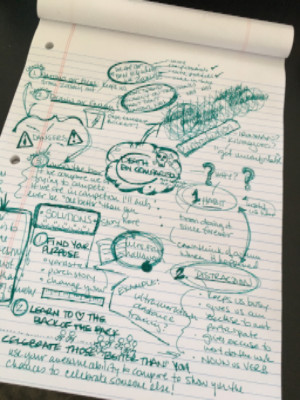
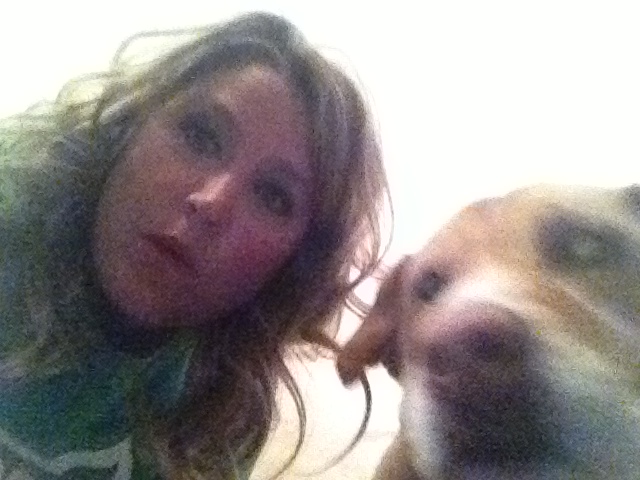
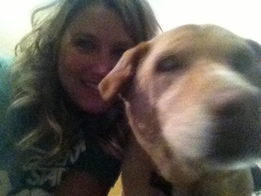
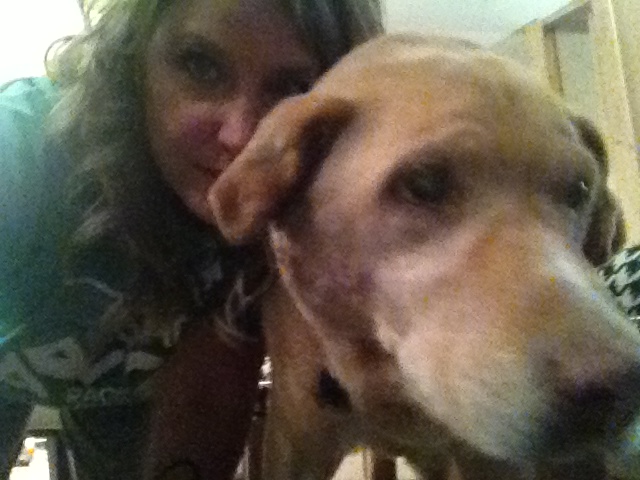
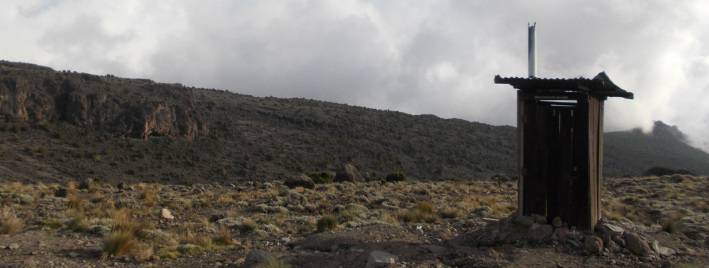
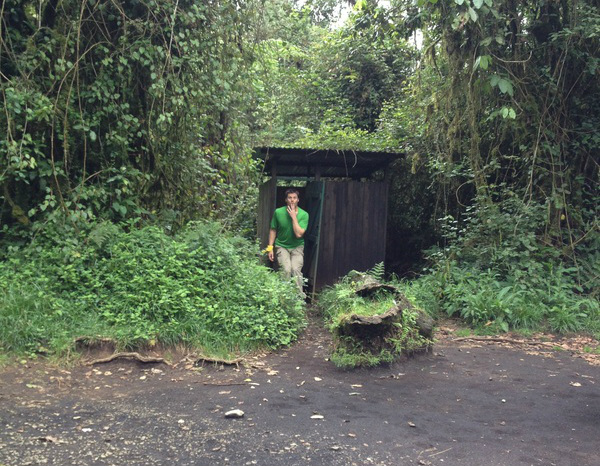

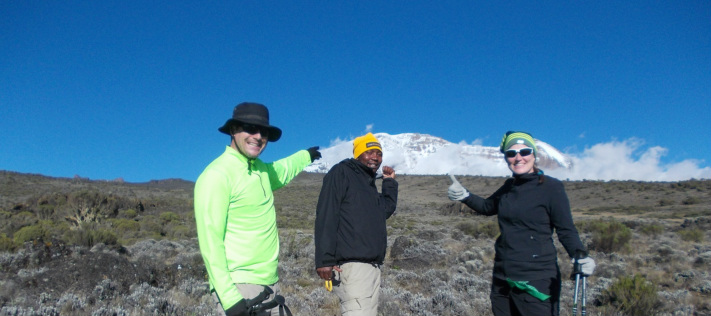

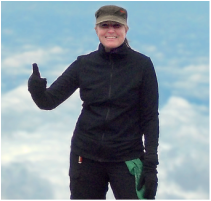
 RSS Feed
RSS Feed